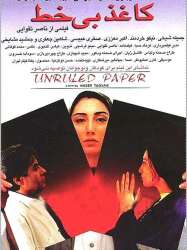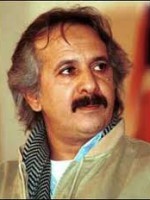Afarin Obeysi is a Actor Iranienne born on 12 march 1951 at Lahijan (Iran)

Afarin Obeysi (en persan آفرین عبیسی), née le 12 mars 1951 à Lahijan, est une actrice iranienne.
Source : Wikidata
Afarin Obeysi

- Infos
- Photos
- Best films
- Family
- Characters
- Awards
Usually with
Filmography of Afarin Obeysi (4 films)
Actress

Crossroads (2006)
, 1h41Origin Iran
Genres Drama
Actors Fatemah Motamed-Aria, Bahram Radan, Baran Kosari, Soroush Sehhat, Afarin Obeysi
Roles mère de Behnaz et Mahssa
Rating58%





Une gynécologue, le docteur Minoo Rahmani, dont le mari est décédé, aimerait se marier avec Dariush. Sa seule inquiétude est son fils Amir, qui fréquente souvent un jeune un peu délinquant, camarade de l’université, Pedram.

The Willow Tree (2005)
, 1h36Directed by Majid Majidi
Origin Iran
Genres Drama
Actors Parviz Parastui, Roya Teymourian, Reza Naji, Leila Otadi, Afarin Obeysi
Rating72%






Unruled Paper (2002)
, 1h50Origin Iran
Genres Drama, Comedy
Actors Khosrow Shakibai, Hedieh Tehrani, Jamshid Mashayekhi, Jamileh Sheykhi, Niku Kheradmand, Afarin Obeysi
Roles Soussan Joon
Rating67%





The film starts with a scene of a sitting room, empty of people, at some two minutes to 7 o'clock in the morning, and ends with a scene of the same empty room at some two minutes past 7 o'clock in the morning of some weeks later; this passage of time is accurately depicted by the brightness of the natural light that is reflected on the wall of a corridor, that leads to this sitting room, in the initial and final scenes. The meticulous attention that Taghvā'i has given to the accurate representation of even the most mundane aspects of the film would at first sight seem to be at odds with the fact that with the exception of the opening and closing scenes, in all other scenes where the clock on the wall of the sitting room is in sight, its pendulum is conspicuously motionless. The opening scene depicts some moments before the family starts a very active day (the day at which the two children of the family, Shangul and Mangul, have their first school-day after the summer school-holiday) and the closing scene, the end of a protracted Friday night, during which Jahāngir and Royā have spent an intellectually and emotionally exhausting night. The motionless pendulum suggests that the events in the intervening period have taken place out of time, or only in imagination. Although the work presented by Taghvā'i certainly qualifies as a surrealist art-form, this motionless pendulum serves as a more profound tool than a means that solely hints at surrealism. Taghvā'i conveys a number of unobtrusive verbal and visual messages to his viewers. Briefly, Taghvā'i and Ms Minoo Farsh'chi, the co-author of the film script, variously refer to the theory of eternal recurrence, as revived by e.g. Friedrich Nietzsche, with a strong emphasis on the importance of having a creative mind thereby to forge room for free will in at least an imaginative world.

The Hidden Half (2001)
, 1h43Directed by Tahmineh Milani
Origin Iran
Genres Drama
Actors Niki Karimi, Atila Pesyani, Afarin Obeysi
Rating68%





The story is told through a manuscript which Fereshteh (Niki Karimi) leaves for her husband (Atila Pesiani) to read. This manuscript tells the story of her life when she was 18 years old and attending the University of Tehran. Fereshteh becomes interested in the fall of the Shah and other such political topics, and so joins a revolutionary, communist group. She gives out fliers, which was illegal as it was the Islamic Revolution period of 1978. Through the group, the young girl meets an older man, a pro-Mossadeq-era intellectual and magazine editor, Roozebeh (Mohammad Nikbin), who is intrigued by her “naive dedication to a noble cause". While government authorities inspect the university and streets of Tehran for revolutionary activists, Roozebeh presents Fereshteh with an opportunity to flee abroad to England. However, when Roozebeh’s wife finds out about the young lady, she informs her of Roozebeh’s family. Thus, when Fereshteh finds out about the intellectual’s wife and son, as well as the fact that she is a lookalike of his childhood sweetheart, she cuts all contact with him. She then marries her husband and does not inform him of her hidden past, only to reveal it to him when he tells her about the woman who is sentenced to death, whom he is interviewing for an appeal. Fereshteh does this in hopes that her husband will listen to the woman in a less critical and more understanding view, and to reveal to him her hidden half.
 Connection
Connection


